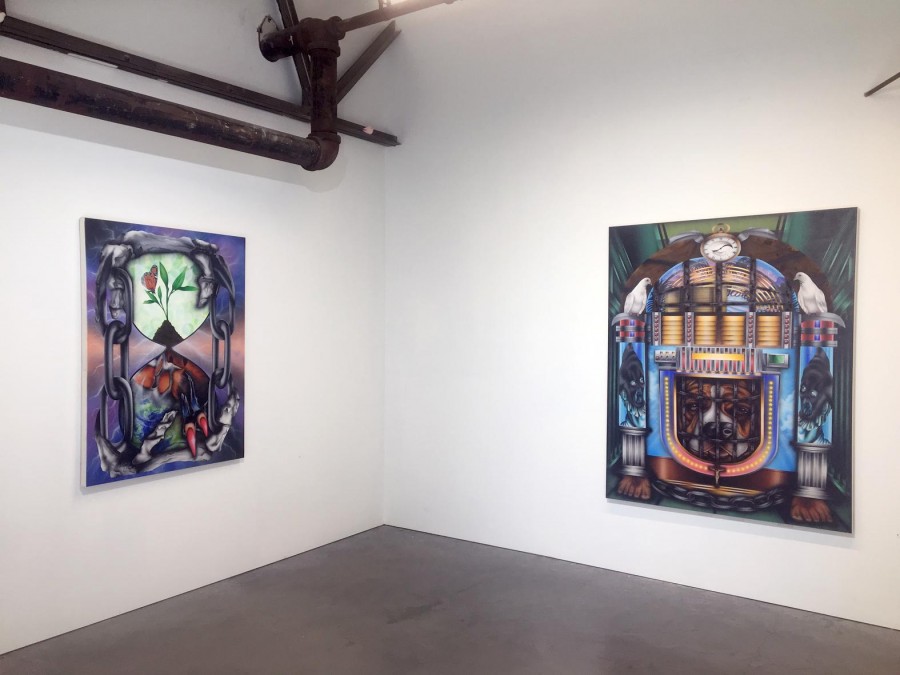Airbrushed Paintings Portray the Isolation and Heartbreak of Mass Incarceration
by DJ Pangburn
The pop art of lowrider subculture doesn't get much play in the mainstream art world, but Los Angeles-based artist Mario Ayala bridges this cultural divide in his new exhibition Pen Pal, now on at Ever Gold [Projects], in which colorful painting collides with Catholic imagery, in an allusion to the American judicial system. Using the visual vernacular of airbrushing, Ayala explores the personal dramas—isolation, heartbreak, lost time—that play out in (and outside) the prison-industrial complex, which imprisons a vastly disproportionate number of people of color.
Perhaps the most striking example of Ayala's artistic collisions is the work Mr. Lonely, a smiling figure, modeled after the Devil, who stands behind prison bars daydreaming of a loved one who can be seen just over his shoulder. Also included in Pen Pal is a mixtape Ayala made with songs from artists—mainly people of color—whose lyrics speak of the trauma of discrimination and incarceration.
Ayala tells Creators that his first memories of anything art-related were drawings made and given to him by his father. The family lived in Inglewood, Los Angeles, and his father worked long hours as a truck driver. Ayala would wait for his father to return home with ballpoint pen drawings of truck drivers, bulldogs, and other subjects on the back of receipts.
"They were the best, [so] I then began drawing trying to imitate these drawings from my dad and continued to use graphite as my primary material until I got enough courage to start using paint in high school," says Ayala. "Now I'm mostly airbrushing, but I use flashe and enamel depending on what I'm painting."
Ayala is interested in these mediums to not only forge an artistic style, but to also reach people outside of the mainstream art world. "I'm concerned with making work that can appeal to the masses by using images that are visually descriptive in a way that can be read from all types of people," Ayala says. "I don't want to make work that intimidates the viewer in a language they can't understand, but rather have an intriguing interest in why I'm using certain images and motifs."
While he does not currently practice, Ayala grew up in a Catholic household. He draws on religious imagery and motifs to create a conversation about how religion is integrated within the prison-industrial complex. "Bibles have always been a source of reading material within prisons," says Ayala. "Self-interventions of one's sins committed, regrets, faith, and aspirations I believe are things that revolve around the ideology of religion that are seen and used in an array of methods by people incarcerated within these institutions."
Ayala wasn't just interested in an art exhibition that critiqued the prison system from afar. He wanted to engage it by connecting prisoners with civilians. "Pen Pal also has a station equipped with envelopes and stationary I made with materials for writing and sending letters to 70 inmates from prisons across California," says Ayala. "[They] requested Pen Pal relationships outside in hopes that the viewers would participate in writing to someone who is seeking someone to have a relationship with that they may not have otherwise."
"I hope I've interested viewers to engage themselves in correspondence with prisoners," he adds. "Or to at least have a mental consideration and compassion for those who have been subjugated to the corruption and solitude that is the prison-industrial complex."
